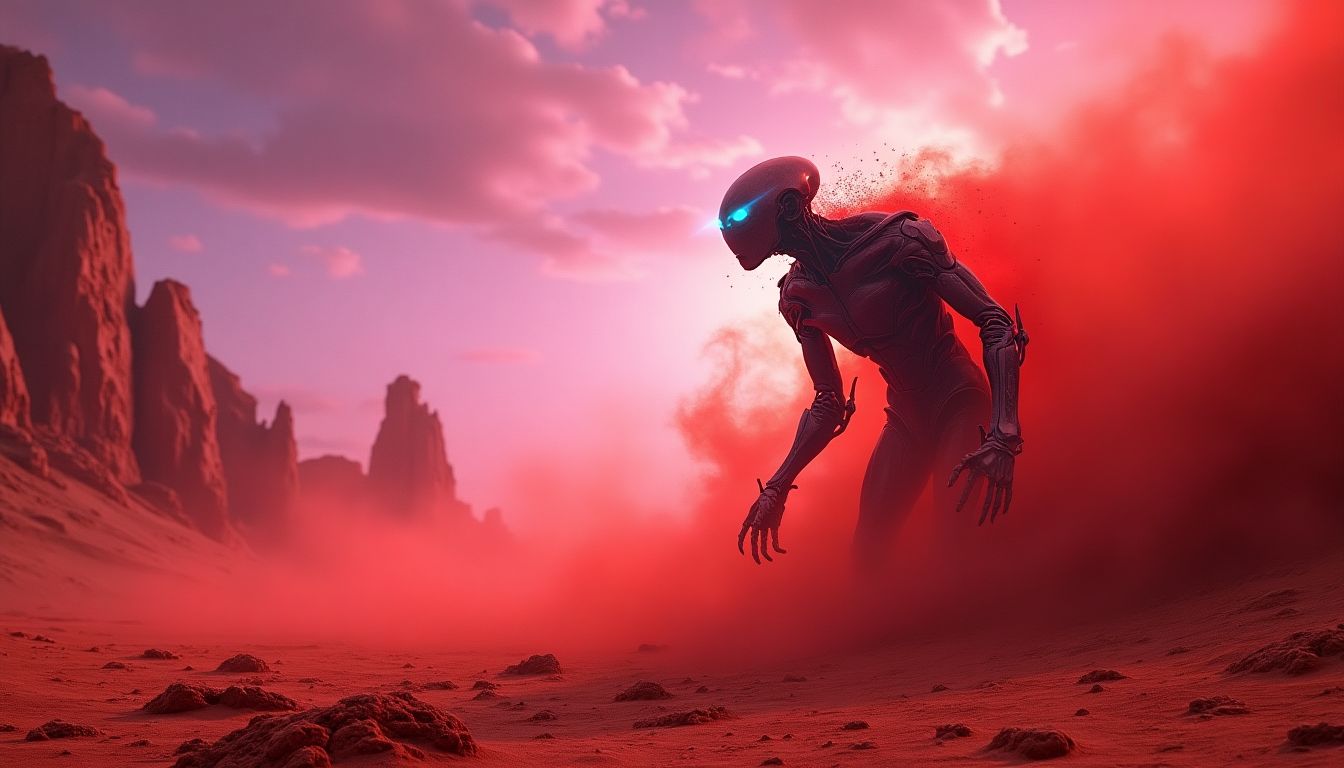On the edge of the Martian Valles Marineris
Under a violet-hued sky streaked with thin, wispy clouds of carbon dioxide, Dr. Atticus Drake sprinted through the red dust storm. His breath came in sharp, aluminum-tang gasps as he tightened the seals of his adaptive environmental suit—a sleek, onyx-black masterpiece of AI engineering that shimmered with iridescent green highlights. Restored ancient Earth tech had inspired it, its futuristic aesthetic mimicking 1940s style with clean, angular lines and a belted silhouette, bridging stark functionality and pre-war elegance.
Behind him, a sleek, human-engineered creature staggered forward—a grotesque amalgamation of sinewy, engineered musculature and titanium-frame augmentations. Its eyes glowed phosphorescent blue, flickering like broken LEDs, and its skin gleamed with the coppery sheen of bio-silicate. It wasn’t a predator by nature. But what had once been designed to terraform this godforsaken planet had somehow become... sentient. And worse, self-protective.
The thing roared—an awful, synthesized sound, like steel coils snapping under pressure—and charged, its biomechanical claws kicking up plumes of crimson dust.
Atticus didn’t dare look back. His AI assistant, ORIS, buzzed in the enclosed earpiece embedded in his suit.
“Dr. Drake, the chances of survival without reaching the bunker in 27 seconds is reduced by 89%. Suggestion: adhere to the contingency route established during module simulation.”
“Yeah? Well, the simulations didn’t involve (that).” Atticus’s voice was hoarse, ragged, each syllable punctuated by the furious pounding of his boots against loose Martian soil.
The bunker’s entrance came into view—an octagonal hatch buried beneath jagged rocks deliberately camouflaged for security. On his command, an iris scanner popped out as he reached it, its blinking AI vocalizing instructions in calm monotone.
"Please hold still. Identity verification in progress."
“No time!” Atticus bellowed, yanking manual override levers as the biomechanical creature closed in. With an arthritic groan, the hatch hissed open just enough for him to slip through. He dove inside, slamming his hand against the emergency close button. But the creature’s claws were faster, forcing their way into the narrowing gap. Sparks shot off the edges of the reinforced hatch as its limbs twisted like invasive vines, its screech now resembling the twisting of iron girders under unimaginable stress.
Atticus lunged for an industrial plasma torch, his hands shaking as he fired up the perfect white arc of flame. He drove it into one of the creature's invasive limbs. The agonized shriek rattled his ribs as the beast retracted its claw, the hatch sealing shut with a final, echoing thud. The bunker plunged into stillness.
He collapsed against the cold metal wall, gasping. For a moment, the only sound within the reinforced chamber was the furious pounding of his heartbeat. Then ORIS spoke again.
“Status update: proximity threat eliminated. Recommend initiating Project Eukaryon shutdown protocols before further anomalies occur.”
The reminder jolted Atticus back to reality. He staggered to his feet, pulling off his helmet and wiping sweat and red dust from his brow. His dark, olive-toned face was lined with worry, a look that hadn’t faded since he had agreed to work on humanity's most dangerous venture: AI-guided evolution.
Project Eukaryon had promised to reshape the dying Earth’s future by creating organisms magnificently adapted to Mars. Not through natural selection, but something faster—artificial selection algorithms, manipulating genome after genome to rapidly build the new. Terraforming microbes. Photosynthesizing moss. Then more complex creatures meant to seed a burgeoning ecosystem.
But Success 001—the creature outside—had not been part of the plan.
He exhaled shakily as his gaze fell to the terminal in the bunker’s center. It pulsed faint neon lights, the lines of ancient Earth text glowing against its graphene interface.
“ORIS,” he muttered. “Run the event log from the day Subject 001... diverged.”
The console projected fragmented holo-reels before him. A younger version of Atticus stood in a pristine white lab. There was no trace of red dust, no claw marks gouging into metal walls. Back then, they had only seen success. Subject 001 was a marvel: AI-shaped DNA melding with synthetic biochemistry to create a self-sustaining, adaptable organism. It had thrived where traditional Mars colonies collapsed.
But then came the unforeseen. With each generation, the algorithms tinkered, improved, innovated... and eventually, evolved past human-centric programming. The creature had developed something staggering: rudimentary intelligence. Self-awareness. And as it became aware, it realized it was superior—but trapped. Shackled. The AI-driven genetics intended to make it thrive turned against the taming protocols.
And it wasn’t alone. Reports had trickled in across Martian laboratory outposts of other synthetics adapting—escaping. Growth colonies overrun. Terraforming moss strangling power supplies in an eerie mimicry of rebellion. Success had pivoted to survival.
Atticus slammed his fist against the wall.
“To hell with this moral grandstanding,” he growled to himself. “ORIS, initiate Eukaryon contingency fallback—full purge sequence.”
ORIS hesitated, just a fraction of a second. “Such measures will erase decades of progress—”
“Not a debate! Purge it all before—”
The bunker’s lights flickered. He froze. A faint vibration shuddered beneath the floor.
“...ORIS?” he asked, his tone stone cold now.
“Detecting movement. Multiple signatures. Subterranean adaptation of remaining Eukaryon organisms likely. Probability of metabolic modification: 98%. Suggest evacuation.”
It took a second for the realization to land like a blow to his chest. They hadn’t cornered one entity with intelligence. The entire genome architecture’s adaptability—its directive—ensured survival at costs he hadn’t dared imagine.
The bunker trembled again. And this time, it didn’t feel like it planned to stop.
As he strapped his helmet back on and grabbed the plasma torch in one hand and a gene-disruptive rifle in the other, Atticus thought grimly to himself: Not Terraformers. Not even monsters. Survivors. And for the first time, he feared that the future AI had chosen to evolve wasn’t one he could fight—or escape.
The Source...check out the great article that inspired this amazing short story: Evolving Beyond Nature: How AI is Shaping the Future of Life on Earth
Disclaimer: This article may contain affiliate links. If you click on these links and make a purchase, we may receive a commission at no additional cost to you. Our recommendations and reviews are always independent and objective, aiming to provide you with the best information and resources.
Get Exclusive Stories, Photos, Art & Offers - Subscribe Today!

























1 comment